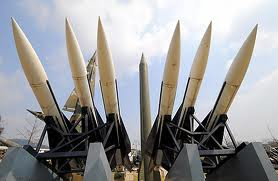 Although tensions across the Taiwan Strait have eased since Taiwan’s current China-friendly administration came to power in 2008, Beijing has never renounced the use of force against Taipei. Beijing has repeatedly vowed to invade Taiwan should the island declare formal independence even though Taiwan has governed itself since the end of civil war in 1949.
Although tensions across the Taiwan Strait have eased since Taiwan’s current China-friendly administration came to power in 2008, Beijing has never renounced the use of force against Taipei. Beijing has repeatedly vowed to invade Taiwan should the island declare formal independence even though Taiwan has governed itself since the end of civil war in 1949. China could raise the number of missiles aimed at Taiwan to 1,900 by the end of the year despite warming ties between the former bitter rivals, according to the island's deputy defense minister. Military experts estimate that the PLA currently has more than 1,600 missiles aimed at the island. Recent media reports have said the People's Liberation Army may boost the number of short-range ballistic and cruise missiles facing Taiwan to 1,960 before the year's end.
China could raise the number of missiles aimed at Taiwan to 1,900 by the end of the year despite warming ties between the former bitter rivals, according to the island's deputy defense minister. Military experts estimate that the PLA currently has more than 1,600 missiles aimed at the island. Recent media reports have said the People's Liberation Army may boost the number of short-range ballistic and cruise missiles facing Taiwan to 1,960 before the year's end.In another sign of the ongoing tensions, two former law enforcement agents from Taiwan have been sentenced to prison terms for selling secrets to China.
Chen Chih-kao, who quit Taiwan's Investigation Bureau 13 years ago to do business in Shanghai, got a three-year jail term for spying for China with the help of Lin Yu-nong. Chen, 58, paid Lin about NT$232,000 (US$7,250) during 2006 and 2007 to collect confidential information on the bureau's “national security net system” and a financial crime-fighting center. Lin, who was fired by the bureau after he was arrested and indicted three years ago, was sentenced to six years in prison.
Washington's announcement, earlier this year, of a new arms package for self-governing Taiwan has angered China and caused a further cooling in relations. Beijing sees Taiwan as a historical part of greater China and is unrelenting in efforts to achieve a single country status. They are hoping that relative autonomy given to Hong Kong and Macau would entice the Taiwanese but they are quick to point out that their patience is not without end.
Not as unlikely as once thought, given Taiwan's growing economic reliance on China. From last month, Chinese qualified investors were allowed to trade in Taiwan stocks, and the two currencies are set to become mutually convertible.
Noted Chinese economist Hu Angang once said that China could force Taiwan to its knees simply by applying economic sanctions.
But as fewer Taiwanese identify themselves as Chinese and instead take pride in local culture, while China shows few signs of democratizing, Taiwan is cold to reunification at present.
If the two sides were to be unified under a system that left Taiwan with its stronger legal environment, foreign firms could find the island an attractive investment destination, with easy access to mainland China's enormous economy.Long-term investors would park more money in Taiwan markets.Investor sentiment would cool if Taiwan's democratic transparency were compromised by Communist rule, or if China limited foreign investor involvement in Taiwan's money and stock markets, assuming they were still allowed to exist.
~~~~~~~~~~~
Notice
This Thursday I am posting a start of an important
discussion of Sharia Law. It will be up at least for Thursday and Friday. I hope you don't miss it as I am sure many of you will have some good comments on the subject.
~~~~~~~~~~~

No comments:
Post a Comment